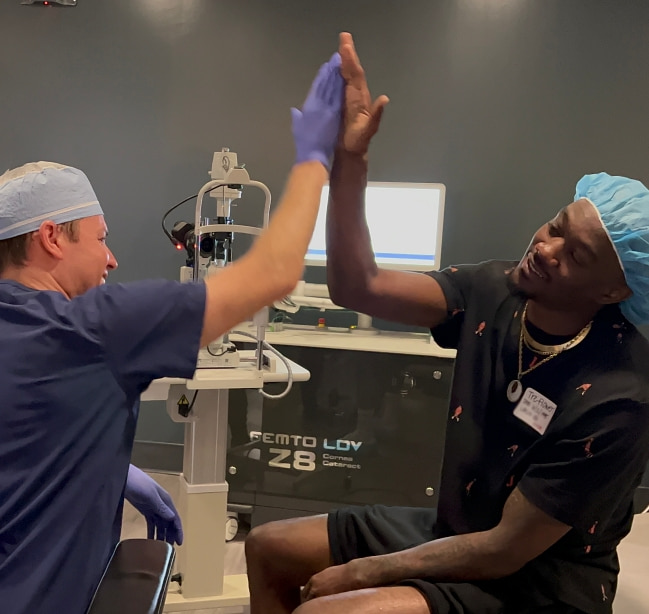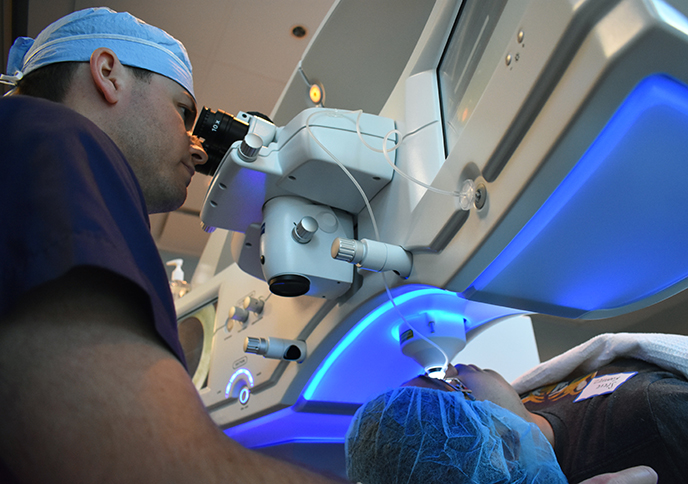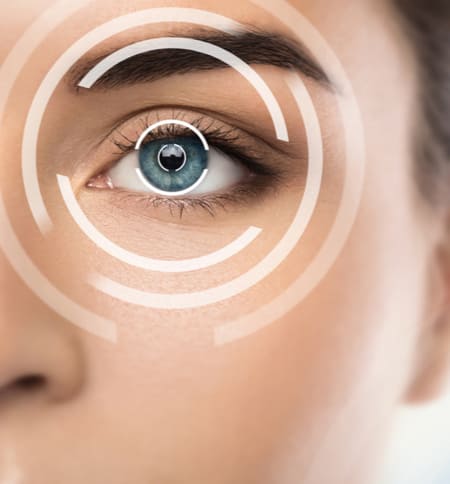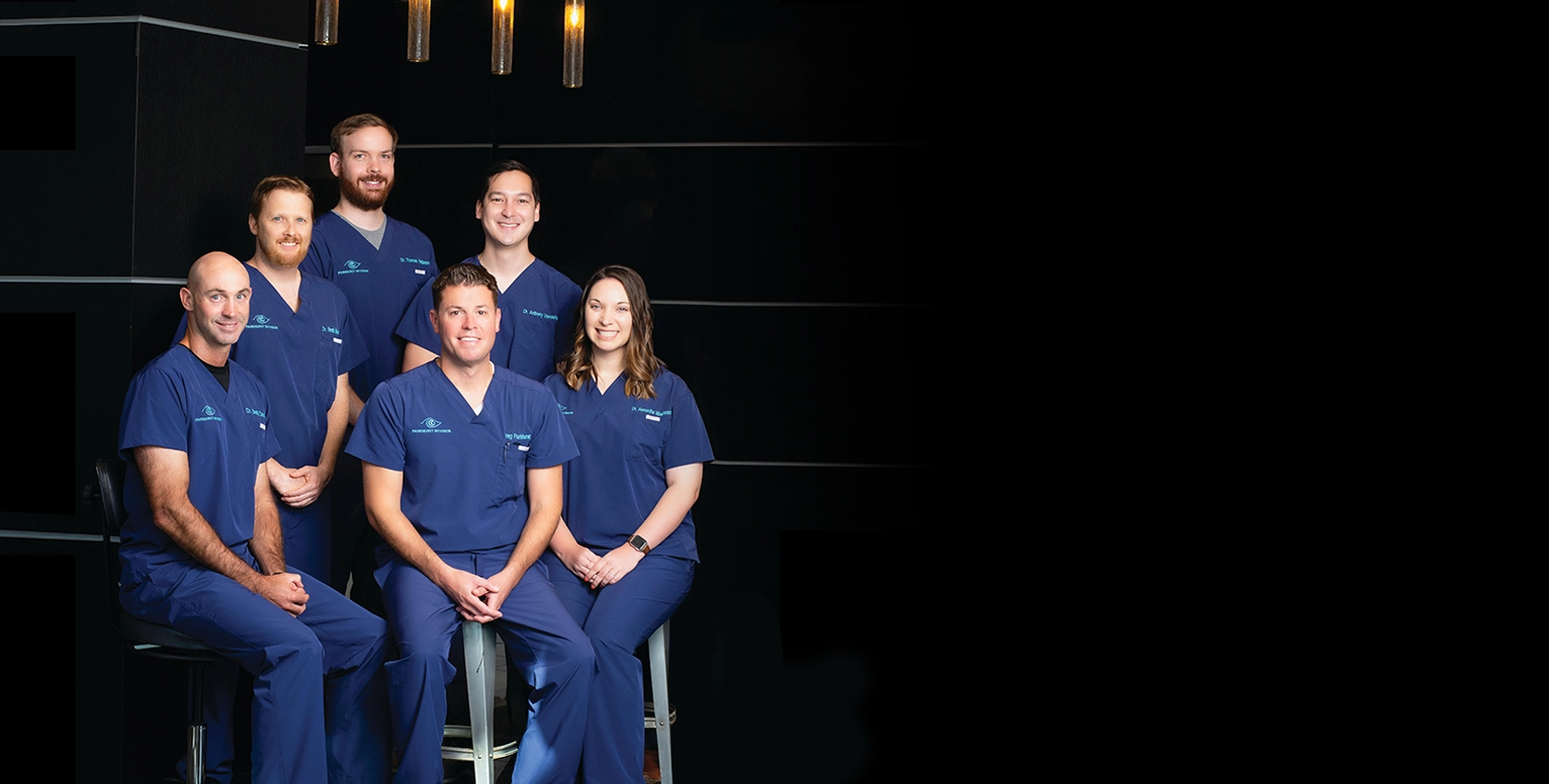1 San Antonio Current. Best of SA 2021. Available: https://www.sacurrent.com/sanantonio/best-lasik-provider/BestOf?oid=26778799 Accessed November 8, 2021.
2 Price MO, Price DA, Bucci FA Jr, Durrie DS, Bond WI, Price FW Jr. Three-Year Longitudinal Survey Comparing Visual Satisfaction with LASIK and Contact Lenses. Ophthalmology. 2016 Aug;123(8):1659-1666. doi: 10.1016/j.ophtha.2016.04.003. Epub 2016 May 18. Available: https://www.microchirurgiaoculare.com/wp-content/uploads/2016/09/Three-Year-Longitudinal-Survey-Comparing-Visual-Satisfaction-with-Lasik-and-Contact-Lenses.pdf
3 Masters J, Kocak M, Waite A. Risk for microbial keratitis: Comparative metaanalysis of contact lens wearers and post-laser in situ keratomileusis patients. J Cataract Refract Surg. 2017 Jan;43(1):67-73. doi: 10.1016/j.jcrs.2016.10.022. PMID: 28317680.
4 Segre L. How Much Does LASIK Eye Surgery Cost? All About Vision. Available: https://www.allaboutvision.com/visionsurgery/cost.htm Accessed September 14, 2021.
5 Kezirian GM, Parkhurst GD, Brinton JP, Norden RA. Prevalence of laser vision correction in ophthalmologists who perform refractive surgery. J Cataract Refract Surg. 2015 Sep;41(9):1826-32. doi: 10.1016/j.jcrs.2015.10.027. PMID: 26603390.
6 American Academy of Ophthalmology. Lasik. Available: https://www.aao.org/eye-health/treatments/lasik. Accessed August 5, 2021.
7 Refractive Surgery Council. Understanding Dry Eye Symptoms After LASIK Eye Surgery. Available: https://americanrefractivesurgerycouncil.org/understanding-dry-eye-symptoms-lasik/ Accessed September 1, 2021.
8 Parkhurst, G. Prospective Comparative Trial of LASIK vs. ICL for Night Vision Performance. Presented at the Annual Meeting of the AAO, Chicago, 2010
9 U.S. Food and Drug Administration (FDA). When is LASIK not for me? Available: https://www.fda.gov/medical-devices/lasik/when-lasik-not-me Accessed November 10, 2021
10 Sandoval HP, Donnenfeld ED, Kohnen T, Lindstrom RL, Potvin R, Tremblay DM, Solomon KD. Modern laser in situ keratomileusis outcomes. J Cataract Refract Surg. 2016 Aug;42(8):1224-34. doi: 10.1016/j.jcrs.2016.07.012. PMID: 27531300.
LASIK
LASIK Eye Surgery in San Antonio
Voted Best LASIK Surgeon in San Antonio
Are you sick of your glasses fogging while you cook? Have you ever had a contact lens pop out of your eye while you were in the middle of an important event? Maybe you are just tired of the discomfort of your contact lenses drying out or the hassle of trying to lie down and watch TV with glasses going crooked on your face. At Parkhurst NuVision LASIK Eye Surgery San Antonio, we specialize in making your life easier and more enjoyable with laser vision correction. Our dedication to helping people see better is regularly recognized by our community, most recently when we were voted Best LASIK Surgeon in San Antonio in a 2021 readers poll by the SA Current.1
“Getting LASIK was the greatest experience I ever had. The procedure itself took about 5-10 minutes and was completely painless. I could see perfectly the next morning. Dr. Parkhurst and his team were extremely professional, experienced, and knowledgeable. They changed my life!”
Jason M.How Does LASIK Work?
LASIK (Laser-Assisted in Situ Keratomileusis) works by reshaping the cornea to enable the light entering the eye to focus properly onto the retina. LASIK employs a specially-calibrated, computer-guided excimer laser to treat nearsightedness, farsightedness, and astigmatism. It is a procedure that permanently recontours the shape of the cornea, the clear covering of the front of the eye, using an excimer laser to help you see more clearly. In nearly all cases, LASIK is pain-free and takes about 8-10 minutes for both eyes. At Parkhurst NuVision, our laser vision correction solutions include SMILE LASIK for even faster recovery.
"We recently saw a patient who was 62 and had LASIK 27 years ago. She was still impressed with her distance vision. She said it's still one of her best investments."
Dr. ParkhurstWhy Get LASIK?
The better question may be why not get LASIK? Glasses and contacts are temporary fixes and have many limitations. Think of it this way: if you break your leg, your doctor will fix it. If your teeth are crooked, you get braces. So if your vision isn’t clear, the logical thing to do is to make it clear with something permanent like LASIK, rather than using temporary crutches like glasses and contacts for the rest of your life.

If your vision isn't clear, the logical thing to do is to make it clear with LASIK.
People are Happier with How They See After LASIK Compared to Contacts and Glasses
In a 3-year study of 1,800 people across the country (half of whom stayed in glasses/contacts, and the other had LASIK), LASIK was the clear winner when it came to patient satisfaction. In fact, 97% of patients agreed that LASIK works better for them than contacts did.2 Contact lens wearers in the same study reported decreased satisfaction year over year, with just 54% reporting they were satisfied with their choice to use contacts at the end of the study. If you are considering LASIK, think about the potential to improve your overall quality of life.

There Are More Vision Procedures Than You Think
If you dream of being able to see clearly when you wake up, but you have previously been told that you are too old, too young, or don’t have the right prescription for LASIK, you should contact us. At Parkhurst NuVision, Dr. Gregory Parkhurst and our team of experts have the skill and experience to treat a wide range of eye prescriptions. We also offer a variety of vision correction procedures and we’d love to explain all your options and create a treatment plan that works for you.

Trust the Science: LASIK is Safer Than Contact Lenses
We understand that some people feel nervous about having a surgical procedure to fix their eyesight. Believe it or not, our goal is not to convince you to have LASIK—it is to give you the knowledge you need to make an informed decision.
Many people do not understand the health and safety risks posed by contact lenses. The fact is that many people do not properly wash their hands before using contacts, do not change their contact lens case often enough, or wear their contacts for too long. Even if you are careful with your contacts, contact lens wearers are at a higher risk for dangerous infections such as microbial keratitis than LASIK patients.3

LASIK Offers You Value and Saves You Money Long-Term
The investment in LASIK can be as little as $78 per eye per month using our payment plans, and with pricing starting at just $2,995 per eye, LASIK is more affordable than ever. LASIK is not as much of an up front cost as many people assume it is, and it is also a “get it and forget it” method of vision correction, while contacts require constant re-ordering and purchasing of supplies, and glasses need to be purchased every year or so. Learn how much you can save with our LASIK cost savings calculator.
Many people who think that LASIK is out of their reach due to cost just haven’t done the math. Here is some math done for you: a person who undergoes LASIK at the age of 18 is likely to save more than $40,000 in vision costs by the time they need reading glasses to address age-related near vision loss (presbyopia) in their mid-40s. We also offer financing and payment options that can help you fit LASIK into your budget.

What Can I Expect From LASIK Step-by-Step?
- ConsultationDiscuss Vision Goals
- ProcedureLess than 10 min
- CongratulationsEnjoy your NuVision!
Your Consultation Appointment
The first step is to schedule a consultation appointment. At your consultation with one of our doctors, we will discuss your vision limitations and goals and recommend the vision procedure that is right for you. Our team is here to answer any and all questions you have about vision correction surgery so you can make an informed decision.
A few days before your LASIK surgery, you will need to stop wearing your contacts and wear eyeglasses exclusively. On the day of your LASIK appointment, we ask that you arrive at our office with no makeup, cream, or lotion on your face. You won’t be able to drive yourself home after your LASIK procedure, so please make arrangements for someone to drive you.

Your LASIK Procedure: The Day You Get Your Vision Fixed!
It is normal to feel both excited and nervous on the day of your LASIK procedure. We are used to day-of-surgery anxiety and we have helped thousands of patients feel at ease before LASIK. If you have any last minute concerns or questions before your procedure, we’ll have the answers, and we are here to ensure you feel both informed and comfortable.
Before LASIK begins, your eyes will be numbed with anesthetic eye drops. We will gently hold your eyelashes out of the way during LASIK surgery, so you won’t need to worry about blinking. You’ll simply recline comfortably while your surgeon uses a cool laser light to remove the imperfections from your cornea improving your vision in seconds. There are no stitches involved, and the entire procedure takes less than ten minutes. So easy and quick!

After LASIK: Your Recovery and Results
After LASIK, your vision will be watery and hazy for the first few hours, similar to looking underwater with your eyes open. Your eyes may feel watery or itchy, but you should not expect pain. These symptoms will fade quickly, and soon you’ll be able to enjoy clearer vision, many people say is even more crisp and clear than how they saw with glasses and contacts. If you have any questions or concerns, rest assured that all patients at Parkhurst NuVision have 24/7 access to their surgeon via cell phone.
Recovery after LASIK is typically fast and easy with minimal restrictions and downtime, especially because we perform SMILE LASIK on many of our patients. People usually return to work the next day, and are able to swim, wear makeup, work out, play sports, and engage in other activities within 24 hours.

"I ended up with better vision than I had expected!"
JoDee A."I did everything I normally do. It's like nothing happened!"
A super busy young mother, the day after LASIK.

Ready for freedom from glasses and contacts?
Request a consultation to get started!
"*" indicates required fields
LASIK Questions? We Have The Answers!
The average cost of LASIK in the United States is $2,246 per eye.4 Your cost will vary depending on your unique needs. At Parkhurst NuVision we offer a full range of payment options and financing plans so you can get the LASIK payment plan that works for you—whether you want to pay with Venmo or take advantage of no-interest financing.
Most insurance providers consider vision correction surgery to be an elective procedure, so LASIK is not typically covered by health insurance. However, some health and vision insurance plans offer partial coverage. Our team can help you navigate your insurance plan to take advantage of any coverage or insurance benefits you may have.
Nope! We know that people worry about this, but your eyes will be numbed with anesthetic eye drops before the procedure begins, and you should feel nothing more than occasional pressure for the duration of the treatment (which only takes a few seconds). Our patients report that the post-LASIK recovery process is also easy and typically painless, and that they can return to work the very next day.
Actually, our patients are always surprised by how quick and easy LASIK is from beginning to end! There is a common misconception that it’s difficult to fit LASIK into your life, when the truth is that LASIK is far less logistically challenging than most people think. For some of our patients, the entire LASIK process (from initial phone call through recovery) takes only a few days.
Yes we do! In fact, ophthalmologists who perform LASIK themselves are four times more likely to get laser vision correction surgery than people in the general population and 98.5% of them recommend laser vision correction surgery to their immediate family members.5
Most patients need to rest for the remainder of the day after their procedure, and are ready to resume regular activities including working, driving, and exercise by the next day.
The number of people who are good candidates for LASIK has grown as technology has expanded. This means more people can benefit from LASIK eye surgery than ever before.
These are a few of the firm requirements that you must meet in order to be eligible for LASIK:6
- Sufficient corneal thickness
- A stable vision prescription
- Healthy eyes that are free from injury, infection, or conditions like glaucoma or keratoconus
The best way to find out if you’re a good candidate for LASIK surgery is to come in for a consultation where we’ll learn about your vision goals, profession, lifestyle, and eye health to determine whether LASIK eye surgery is right for you. If LASIK itself isn’t a great fit, you will likely still be eligible for life-changing vision correction from one of the many vision correction surgeries we specialize in, such as PRK, SMILE-LASIK, EVO ICL, and/or laser lens treatment.
Curious about LASIK candidacy? Take our 30-Second Self-Test.
LASIK and other Advanced Vision Correction procedures are some of the most successful surgical procedures ever introduced to human medicine. That being said, every surgical procedure performed on the human body (and non-surgical medical treatments for that matter) has risks. Possible risks of LASIK include:
- Under Response/Over Response: During LASIK surgery, the surgeon uses a computer-guided laser to reshape precise amounts of corneal tissue to correct vision. In a biological system, it is possible for some tissues to behave differently than the vast majority of others. If this occurs, it is possible to have a small amount of residual nearsightedness or farsightedness after the first procedure. In most cases, this may be enhanced via a 2nd “fine-tuning” procedure if necessary. In our experience, enhancement procedures are needed in less than 1% of cases.
- Dryness: Some patients have noticed dryness of the eyes after LASIK. In almost all cases, this resolves quickly with the use of artificial tears and healing time in a matter of a few weeks. It is rare for dryness to be a long-term side-effect or complication of modern LASIK performed on good candidates. In fact, recent studies show dryness after LASIK is actually much less than dry eyes experienced in people who stay in their contact lenses.7
- Night Vision and other Quality of Vision Changes: Some patients have noticed glare and halos, glare, and starburst at night after LASIK. This is fairly common during the healing period but tends to improve dramatically as the eye heals. This is one area where technological advancement has resulted in significant improvement. Persistent night vision disturbances are now rare, and in more cases improved after LASIK. In a clinical trial performed by Dr. Parkhurst and presented at the American Society of Cataract & Refractive Surgery in 2011, there was a significant improvement in night vision after both LASIK and EVO ICL.8
In our experience, these risks are extremely rare when patients are selected properly, modern technology is used, and those who may not be good candidates are instructed they may have different or lower risks if they remain in their glasses and contact lenses to see.
The most common reason people need glasses after LASIK is presbyopia. Presbyopia is the naturally occurring loss of near vision that occurs from the normal aging process in all humans who reach a certain age. Around the age of 40, the natural lens of the eye hardens and is no longer able to zoom in close like it could when it was younger.
For people who wear glasses at this age, bifocals are prescribed for far and near vision. For people who wear contacts, were born with good vision, or who had their vision corrected with LASIK, reading glasses become necessary after age 40. This is not a failure of LASIK, but rather an expected event due to the normal aging process. Many of our patients over 40 understand this limitation and still see the value in LASIK, which is to be able to see most things except for the smaller print up close.
There are now several options to treat not only far vision but also near vision after 40. We encourage you to contact us to find out how technology has advanced. We may be able to help.
LASIK lasts a lifetime. That means the earlier you get LASIK, the longer you’ll enjoy it and the more value you will get from it!
LASIK is a great choice for many people who would like the freedom of better vision without glasses or contacts. However, there are some people who should not have LASIK, including:9
- People who are under 18 years of age
- Women during pregnancy
- People who have had a significant change in their vision prescription within the last year
- People with conditions the prevent proper wound healing, such as certain autoimmune diseases
- People with advanced glaucoma or inflammatory eye conditions such as uveitis
If you are interested in LASIK but have been told that you cannot have laser vision correction due to thin corneas, large pupils, or dry eyes, we encourage you to contact us. We offer a wider range of vision correction procedures compared to other LASIK practices and we are experienced in helping people who previously thought they were not candidates.
We advise patients to go home and take a nap to rest their eyes after LASIK. You should not watch TV immediately because it can strain your eyes, but you can watch TV and use your phone once you wake up several hours after your procedure.
No, you do not need to wear sunglasses to watch TV after LASIK. However, you should wear sunglasses whenever you are outside in bright sunlight to protect your eyes from UV rays.
The best thing to do immediately after laser eye surgery is to take a nap, so you might want to avoid texting or watching things on your phone immediately after your procedure, so you can get to sleep right away. Once you wake up, you can talk on the phone, use voice-to-text, or listen to podcasts after your LASIK, but minimizing screen time for the first few hours is advised.
You should avoid getting the area around your eyes wet for 24 hours after LASIK. If you do shower, take care to keep the water away from your eyes.
Yes, crying is okay and will not harm your LASIK recovery.
It is best to wait until the day after surgery to take a bath.
Yes you can sleep in whatever position is comfortable but it is important to protect your eyes while they are healing, so we will provide you with eye shields to wear at night for the first week after surgery.
You need to avoid rubbing your eyes for two weeks after LASIK, in order to allow your cornea to heal. If you accidentally rub your eye, you may be fine. However, if you rub your eye and you experience pain, blurred vision, or excessive watering, contact us right away so we can examine your eye.
We advise patients to avoid caffeine the day of surgery because it is important to stay hydrated and sleep a lot. Caffeine is a diuretic, which means that it can increase dehydration and make your eyes feel dry.
Our team will give you a detailed guide to LASIK Do’s and Don’ts. In general, you’ll need to temporarily avoid contact sports and swimming in the days or weeks after LASIK. Traditional LASIK requires you to refrain from working out or using eye makeup for several weeks after your procedure, but we often perform SMILE LASIK, which allows you to get back to these activities much sooner, often within 24 hours of your procedure.
Your recovery time will vary depending on the type of procedure you had as well as your body’s individual healing process. The best way to ensure optimal healing is to follow all instructions from your surgeon and our team.
We advise you to go home and take a nap after your procedure. Once you have spent some time resting, you can go for a walk.
This is a common myth based on older LASIK technology. Complete healing of the cornea does take time and varies for each patient, but for most patients the cornea is mostly healed within 2 weeks and has healed completely within one year.
This varies person by person, but generally redness goes away within 1 to 3 days.
No, LASIK makes permanent changes to the cornea to correct the imperfections causing your blurry vision.
Blurry vision after LASIK typically resolves within a few days.
Yes! LASIK improves vision by correcting imperfections in your cornea, and it is designed to give you clear, crisp vision.
Yes, LASIK can correct astigmatism up to 6.0 diopters, and certain procedures can go even higher than that.
The severity of your astigmatism may have a slight effect on your healing time, but astigmatism does not generally affect your overall recovery.
Many people who are nearsighted also have astigmatism and LASIK can be a great choice to correct both. LASIK has a very high success rate and a very high rate of patient satisfaction.10
Some blurriness is a normal early side effect after LASIK eye surgery, but it is typically temporary, usually lasting only a few days.
No, LASIK does not change the appearance of your eyes. Of course, people may think that you look different if they are used to seeing you in glasses!

